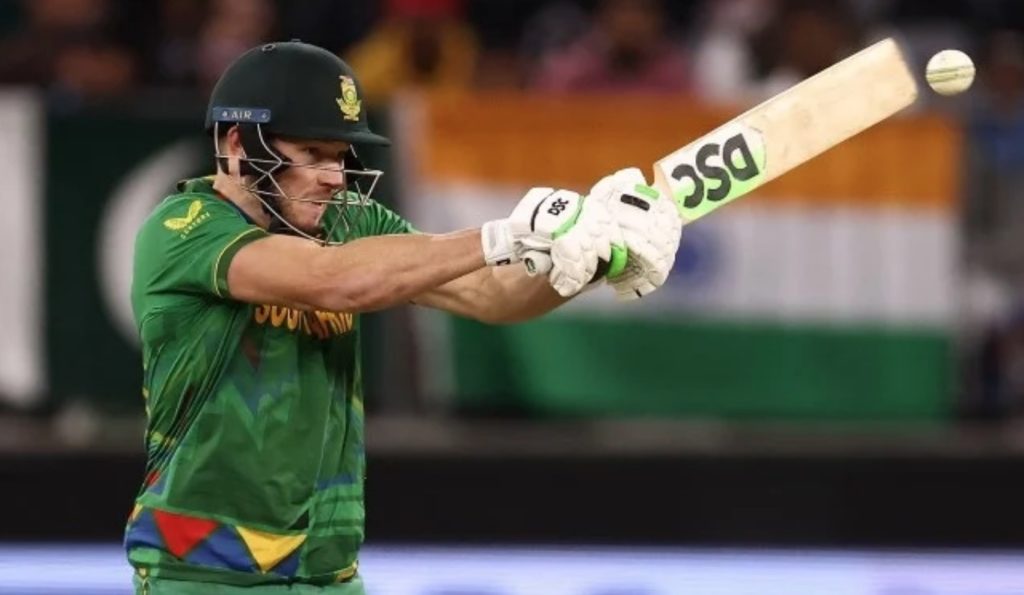David Miller has become the pre-eminent and most valuable T20 batsman in the world after years of betraying his potential, writes RYAN VREDE.
I scanned Indian cricket Twitter after Suryakumar Yadav’s defiant and skilful innings of 68 against the Proteas in Perth on Sunday. The overriding sentiment was that he was the world’s best T20 batsman.
He is a dynamic batter that compels you to watch. His scoring spectrum is broad, his hitting power amplifies his threat, and his temperament complements his talent. He is a fine player, one of the format’s best, but not the best at present. That would be Miller.
Miller underlined that assertion when he walked to the crease in Perth at 24-3. The Proteas, having shared the points in a rain-affected opener against Zimbabwe, needed to beat India to retain control of their pathway to the semi-final.
What followed, was a masterclass in tactics and the execution thereof under immense pressure. It would be remiss not to celebrate Aiden’s Markram’s contribution to a 76-run partnership that got the Proteas back into the contest. His approach after drinks was central to their success.
But it was Miller who exhibited the fullness of his maturity to take his side home.
A year ago, Miller averaged 8.6 at the World Cup. In 15 innings since then, he has averaged nearly 70 at a strike rate of 170.29. To reinforce his superiority over Yadav, the India gun has averaged 44.25 at a strike rate of 178.78. He bats at No 4, Miller at No 6. Their roles are different but Yadav, broadly speaking, has more time to build an innings than his South African counterpart.
Furthermore, all 15 of those Miller innings have come away from home. Nine of Yadav’s 15 have been played outside India, and a further five in the UAE in conditions that are similar to those in India.
Both are world-class operators, but the rhetoric that Yadav is the format’s best is flawed by every significant metric.
Miller’s post-T20 2021 World Cup renaissance began at this year’s IPL, where he averaged 68.71 at a strike rate of 142.72. He scored 32 off 19 deliveries in the final to help guide the Gujarat Titans to victory.
Much of his success has been attributed to work done with Titans head coach Gary Kirsten. Miller has acknowledged Kirsten’s influence, but I don’t accept that this alone has sparked the performances, and the consistency thereof, that have made him the world’s best.
READ: How Kirsten got the best out of Miller
I suspect that a depth of both personal and professional emotional maturity has been the cornerstone of Miller’s rise. He is 33 years old and has spent the better part of a 12-year international career reaching for a standard many expected him to attain as a 23-year-old.
Miller was never a liability but, in hindsight, he was revealed to be one of those players who touched the ceiling of their potential later in their career. The convergence of his talent, temperament, broad skill set, and tactical intelligence took time. But it was worth the wait.
I didn’t expect the turnaround, certainly not to the extent we’ve seen. In 2020, Miller was riding the bench for the Rajasthan Royals, after being released by the Kings XI Punjab. His career appeared to have stalled, and I wrote a piece wondering what would become of a player South African cricket and its support base had invested so much in.
Prior to the 2020 IPL, ESPNcricinfo’s Sruthi Ravindranath asked Miller whether his best was yet to come. “Definitely,” he declared. “I feel I’m very experienced, very well put together in my mind and a lot calmer. I’m still learning; everyone learns along the way. I’m certainly very excited about the latter part of my career and really looking forward to putting on some big performances. I’ve certainly got a lot to offer.”
I was skeptical and wrote that for his assertion to be tested, his experience and technical skill need a platform for expression. He got that at the Gujarat Titans, and the Proteas have benefited in myriad ways from the fullness he has found.







